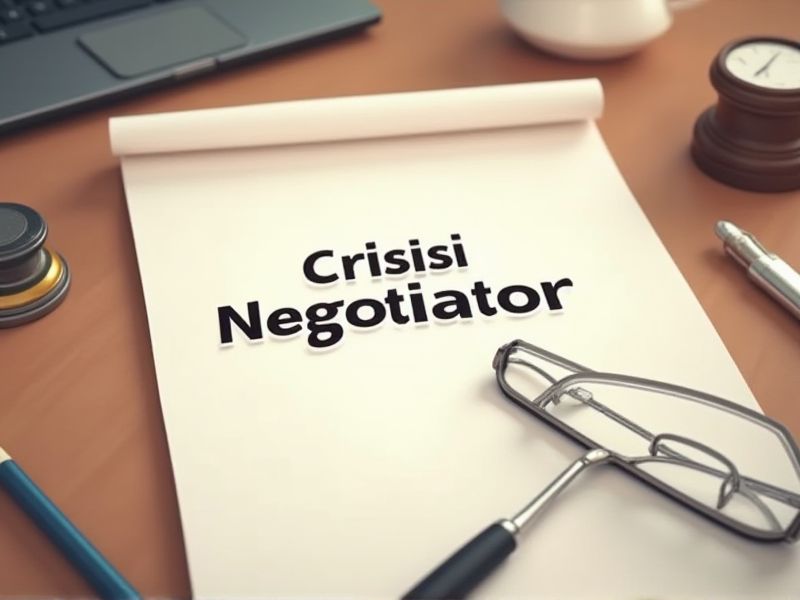
Crisis negotiation demands a precise set of skills to handle high-stress situations effectively, and certifications ensure professionals meet these critical standards. Certification helps develop techniques in communication, psychology, and conflict resolution vital for negotiating peacefully. Rigorous training further bolsters credibility and instills community trust in the negotiator's ability. Below are some essential certifications you may need as a Crisis Negotiator.
Crisis Negotiation Certification
Crisis Negotiation Certification ensures negotiators possess essential skills in communication and conflict resolution, enhancing the likelihood of peaceful outcomes. This certification provides a standardized framework and training, enabling professionals to approach high-stress situations with proven methodologies. It validates the negotiator's expertise and commitment, which can foster trust with both law enforcement agencies and the individuals in crisis. The credentials can also contribute to career advancement and recognition within the field of crisis management.
Crisis Intervention Team (CIT) Training Certification
Crisis Intervention Team (CIT) training certification equips crisis negotiators with essential skills for effective communication with individuals experiencing mental health crises. This specialized training enhances understanding of mental health disorders, which is critical for de-escalating potentially volatile situations. Certified negotiators are better prepared to assess risks and apply appropriate intervention strategies, reducing the likelihood of harm. The certification ensures a standardized approach within law enforcement agencies, promoting safer outcomes for both officers and individuals in crisis.
Psychological First Aid Certification
Psychological First Aid Certification equips crisis negotiators with essential skills to manage high-stress environments effectively. Understanding basic psychological techniques can help de-escalate volatile situations, reducing the risk of harm to individuals involved. The certification provides negotiators with tools to better understand the emotional and mental states of those in crisis, enhancing communication and empathy. This training allows negotiators to offer support that can stabilize situations until specialized mental health resources are available.
Negotiation and Mediation Certification
Certification in negotiation and mediation equips crisis negotiators with advanced techniques for de-escalating high-stakes situations. It provides standardized training, ensuring proficiency and competence in managing tense environments. This certification also enhances credibility, fostering trust and cooperation from involved parties. It aids in continuous professional development, keeping negotiators updated with evolving strategies and best practices.
Behavioral Analysis in Crisis Situations Certification
Crisis negotiators often encounter unpredictable situations, and a Behavioral Analysis in Crisis Situations Certification equips them with a deeper understanding of human behavior, enhancing their ability to assess and respond effectively. Such certification provides specialized knowledge on the psychological underpinnings of crisis behavior, aiding in the development of more effective communication strategies. The certification also offers evidence-based techniques and frameworks which support more structured and effective decision-making processes. A comprehensive grasp of behavioral analysis ensures negotiators can identify and de-escalate potentially dangerous situations, protecting both individuals in crisis and the wider community.
Active Listening and Empathy Training Certification
Crisis negotiators often face high-pressure situations where clear communication can mean the difference between life and death, making active listening essential to accurately interpret what the other party is conveying. Empathy training enhances a negotiator's ability to establish rapport, fostering trust and reducing tension during tense interactions. The certification process equips negotiators with validated techniques that are informed by the latest research, improving their effectiveness in de-escalating situations. With enhanced skills in these areas, negotiators contribute to safer resolutions, minimizing harm for all parties involved.
Conflict Resolution Certification
Crisis negotiators often face high-pressure situations that demand advanced conflict resolution skills to effectively defuse tense standoffs. Certification programs provide structured training and strategies to handle complex negotiations, reducing the likelihood of escalation. Employers prioritize certified professionals because they have demonstrated expertise and commitment to maintaining safety and achieving positive outcomes. Continuous education through certification ensures negotiators stay updated with the latest techniques and legal considerations.
Trauma-Informed Care Certification
Trauma-Informed Care Certification equips crisis negotiators with the skills to identify and address trauma, which enhances their ability to de-escalate tense situations. Understanding trauma responses improves communication, fostering trust and rapport with individuals in crisis. With certification, negotiators can reduce the likelihood of retraumatization, which can worsen a crisis. This training supports outcomes that are safer and more effective for both the individuals in crisis and the negotiators.
Critical Incident Stress Management (CISM) Certification
Crisis negotiators often encounter high-stress situations that can lead to psychological distress, and CISM Certification provides them with the tools to manage such stress effectively. The programming focuses on understanding and mitigating the impact of critical incidents, promoting emotional resilience among negotiators. By gaining certification, negotiators can better support their own mental health and the well-being of their team members. This preparedness enhances their ability to remain calm and efficient during high-pressure negotiations, potentially leading to more successful resolutions.
De-escalation Techniques Certification
De-escalation Techniques Certification is crucial for crisis negotiators because it equips them with skills to manage high-stress situations effectively. Certified training enhances the ability to diffuse potentially violent encounters, reducing the likelihood of harm. Proper certification provides negotiators with the updated strategies and tactics that reflect current best practices. Such training also supports law enforcement agencies in fostering public trust and accountability.
Summary
You will likely notice enhanced communication skills in crisis situations when a Crisis Negotiator obtains relevant certifications. These certifications often provide advanced training techniques, which could improve your efficiency in conflict resolution. With specialized knowledge, you are expected to handle volatile situations with greater confidence and expertise. The certifications may also increase your value and career opportunities within law enforcement or related fields.
